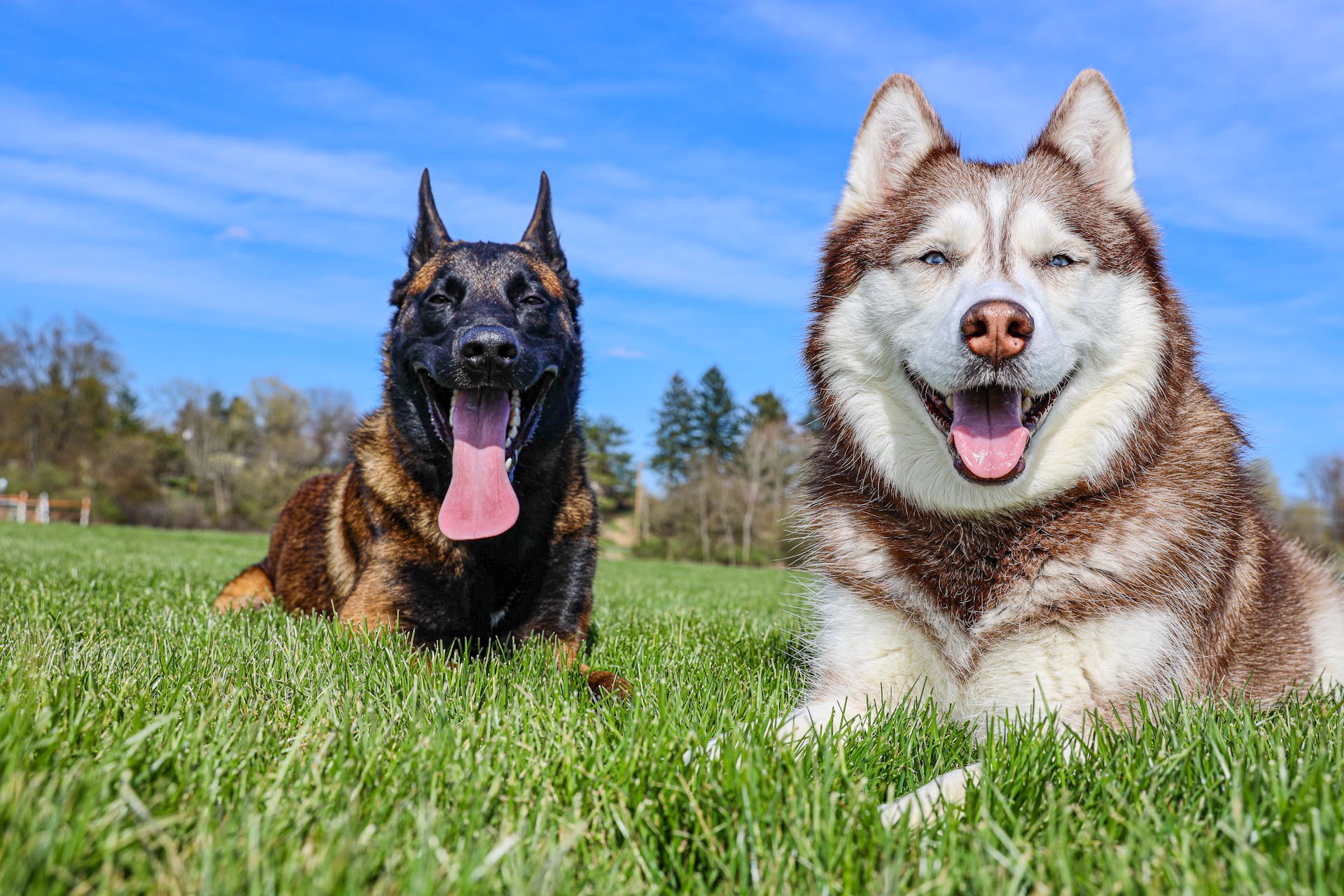
Water retention in dogs can be a frustrating and concerning issue for pet owners. One of the main causes of water retention in dogs is a condition called heart disease, which can lead to fluid buildup in the body.
Dogs with heart disease may experience symptoms such as coughing, difficulty breathing, and swelling in the abdomen and legs.
In some cases, water retention in dogs can be caused by kidney disease, which can lead to a buildup of toxins in the body and cause swelling.
Dogs with kidney disease may also experience symptoms such as vomiting, diarrhea, and lethargy.
Take a look at this: Von Willebrand Disease in Doberman Pinschers
Symptoms and Diagnosis
Symptoms of water retention in dogs can be subtle, but if you notice one or more of these signs, you should take your dog to the vet as soon as possible. The symptoms can vary depending on the part of the body affected, but common signs include swelling of the legs, paws, belly, or face, weight gain, shortness of breath, tiredness, loss of appetite, and skin changes such as redness, itching, or hair loss.
If your dog is experiencing swelling in just one small part of their body, inflammation is usually the underlying cause. However, if your dog looks puffy all over, it could be due to a lack of protein, too much sodium, or a severe bacterial infection.
In some cases, the swelling may not be visible, but you may notice signs of fluid accumulation, such as difficulty breathing or neurologic symptoms/seizures.
Here are some common symptoms of edema in dogs:
- Swelling in one small part of the body (inflammation)
- Puffy appearance all over the body (lack of protein, too much sodium, or severe bacterial infection)
- Swollen abdomen (organ swelling, fluid accumulation, or blood in the abdomen)
- Difficulty breathing (pulmonary edema or effusion)
- Neurologic symptoms or seizures (cerebral edema)
To diagnose water retention in dogs, your veterinarian will take a thorough history and conduct a complete physical examination. They may also request diagnostic testing, such as a complete blood count, biochemistry profile, and urinalysis, to determine the underlying cause of the swelling.
Symptoms
If you notice your dog is experiencing swelling in their legs, paws, belly, or face, it could be a sign of water retention. This swelling can be accompanied by weight gain.

Weight gain is a common symptom of water retention in dogs. It's essential to monitor your dog's weight and look for any changes.
Shortness of breath can be a sign of water retention, especially if your dog's swelling is affecting their chest. This can be a serious symptom and requires immediate attention.
Tiredness and loss of appetite are also common symptoms of water retention. If you notice your dog is lethargic or not interested in food, it's a good idea to take them to the vet.
Skin changes such as redness, itching, or hair loss can also be a sign of water retention. These changes can be subtle, so it's essential to keep an eye out for any unusual symptoms.
Here are some common symptoms of water retention in dogs:
- Swelling of the legs, paws, belly, or face
- Weight gain
- Shortness of breath
- Tiredness
- Loss of appetite
- Skin changes such as redness, itching, or hair loss
How Vets Diagnose
Diagnosing edema in dogs requires a thorough approach. A veterinarian will take a complete physical examination and ask for a detailed history to understand the dog's symptoms.
The first step often involves running some basic tests, including a complete blood count, biochemistry profile, and urinalysis. These tests can provide valuable information about the dog's overall health.
In some cases, a thyroid test may also be necessary. This can help identify any underlying thyroid issues that may be contributing to the edema.
If fluid has accumulated in a specific area, such as the chest or abdomen, a veterinarian may request permission to aspirate some of the fluid for examination. This can be a useful diagnostic tool in these situations.
Getting a diagnosis often requires a combination of these tests and a physical examination.
On a similar theme: How Often Should You Change Your Dog's Water?
Fluid accumulation
Fluid accumulation is a common issue in dogs, and it's essential to understand the signs and symptoms to provide the best care for your furry friend. The symptoms of fluid accumulation can vary depending on the part of the body affected, but common signs include swelling of the legs, paws, belly, or face.
See what others are reading: How Common Is Pyometra in Dogs
Weight gain can also be a sign of fluid accumulation, as excess fluid can cause weight gain. Shortness of breath and tiredness are also common symptoms, as fluid accumulation can put pressure on the lungs and heart.
Loss of appetite and skin changes such as redness, itching, or hair loss can also be indicative of fluid accumulation. It's crucial to take your dog to the vet as soon as possible if you notice any of these symptoms.
In some cases, fluid accumulation can be a sign of a more serious underlying condition, such as heart disease or kidney disease. A thorough history and physical examination by a veterinarian can help identify the underlying cause.
A complete blood count, biochemistry profile, and urinalysis are often necessary to diagnose fluid accumulation. In some cases, a veterinarian may also need to aspirate some of the fluid for examination.
The accumulation of excess fluid in the body's tissues is known as edema. Edema can occur due to various reasons, including heart failure, kidney disease, liver disease, or malnutrition.
Check this out: Can a Bug Bite Cause a Lump on a Dog
Causes and Risk Factors
Water retention in dogs can be caused by a variety of factors, most of which are related to an imbalance of fluid in the body.
Heart failure is a common cause of water retention in dogs, where the heart is no longer pumping enough blood around the body, causing fluid to build up in the vessels and leak into the tissues.
Renal insufficiency is another possible cause, where the kidneys can no longer filter enough waste products from the blood, leading to fluid accumulation in the body.
Liver disease can also contribute to water retention, as the liver no longer produces enough protein, causing pressure in the blood vessels to drop and fluid to leak into the tissues.
Infections, such as bacterial or viral infections, can cause inflammation, which increases the permeability of the vessels and allows fluid to leak into the tissues.
Injuries, whether due to accidents or surgery, can also lead to swelling, trapping fluid in the tissues and causing water retention.
Related reading: Female Dog Leaking Smelly Fluid
Allergies can cause an allergic reaction, leading to vessels dilating and fluid spilling into the tissues, resulting in water retention.
Here are some common causes of water retention in dogs:
- Heart failure
- Renal insufficiency
- Liver disease
- Infections
- Injuries
- Allergies
Edema caused by inflammation is usually less serious than other forms of edema, and can often be resolved once the underlying cause is diagnosed and treated.
Prevention and Management
Regular veterinary check-ups are crucial in detecting and treating potential conditions early, reducing the risk of water retention in dogs. Regular visits to the vet can help identify underlying issues before they become severe.
A high-quality diet that meets your dog's nutritional needs is essential in preventing water retention. Avoid feeding your dog a diet with harmful additives that can exacerbate the condition.
Regular exercise is also vital in strengthening your dog's cardiovascular system and controlling their weight, both of which can contribute to water retention. Adequate exercise can help reduce the risk of water retention in dogs.
Here are some tips to reduce the risk of water retention in dogs:
- Feed a high-quality diet that meets their nutritional needs.
- Make sure your dog gets enough exercise to strengthen their cardiovascular system and control their weight.
- Avoid stressful situations that can cause your dog to retain water.
Prevention Is Key

Regular veterinary check-ups can help detect potential conditions early, reducing the risk of water retention in dogs. This can make a big difference in your dog's overall health.
To prevent water retention, it's essential to feed your dog a high-quality diet that meets their nutritional needs. Avoiding harmful additives can also help.
Adequate exercise is crucial for your dog's cardiovascular system and weight control. This can be as simple as a daily walk or playtime in the yard.
Stress reduction is also vital for preventing water retention. Avoid exposing your dog to loud noises, strange people or animals, or sudden changes in their environment.
If your dog loves to swim, pay attention to their swimming style. If they tend to splash and hold their head low in the water, with their mouth open, they may be at greater risk for water intoxication.
To keep your dog safe while swimming, take frequent rest breaks and give them plenty of opportunities to relieve themselves. This can help remove excess fluid and prevent water retention.

Avoid using round-shaped toys like tennis balls when your dog is swimming, as they can increase the risk of water intoxication. Instead, opt for flatter objects like flying discs.
Remember, prevention is key when it comes to water retention and water intoxication. By taking these simple steps, you can help keep your dog safe and healthy.
Recommended read: Water Intoxication for Dogs
Recovery and Management
Edema in dogs can be a serious condition, and almost all cases require care and medications at home after the office visit.
The length of a dog's hospital stay will depend on the underlying cause of the edema, with cases caused by inflammation often being the quickest to resolve.
Some cases of edema will require lifelong treatment, especially those caused by heart failure.
Any edema that affects a large area of the body, such as the entire leg or body, is usually considered serious and requires thorough investigation and aggressive treatment.
Once the underlying cause of the edema is found, it becomes easier to develop an appropriate treatment plan.
Expand your knowledge: Bad Odor from Dog
Frequently Asked Questions
What does edema look like in dogs?
Edema in dogs can manifest as localized swelling in specific areas, such as paws or joints, or as general puffiness in the face and limbs. If you suspect edema in your dog, it's essential to consult a veterinarian for proper diagnosis and treatment.
Sources
- https://www.fellow.dog/health/water-retention
- https://www.akc.org/expert-advice/health/can-dogs-drink-much-water-dangers-water-intoxication/
- https://www.akc.org/expert-advice/health/warning-signs-dehydration-dogs/
- https://www.dailypaws.com/furosemide-for-dogs-7491293
- https://www.petmd.com/dog/symptoms/edema
Featured Images: pexels.com


